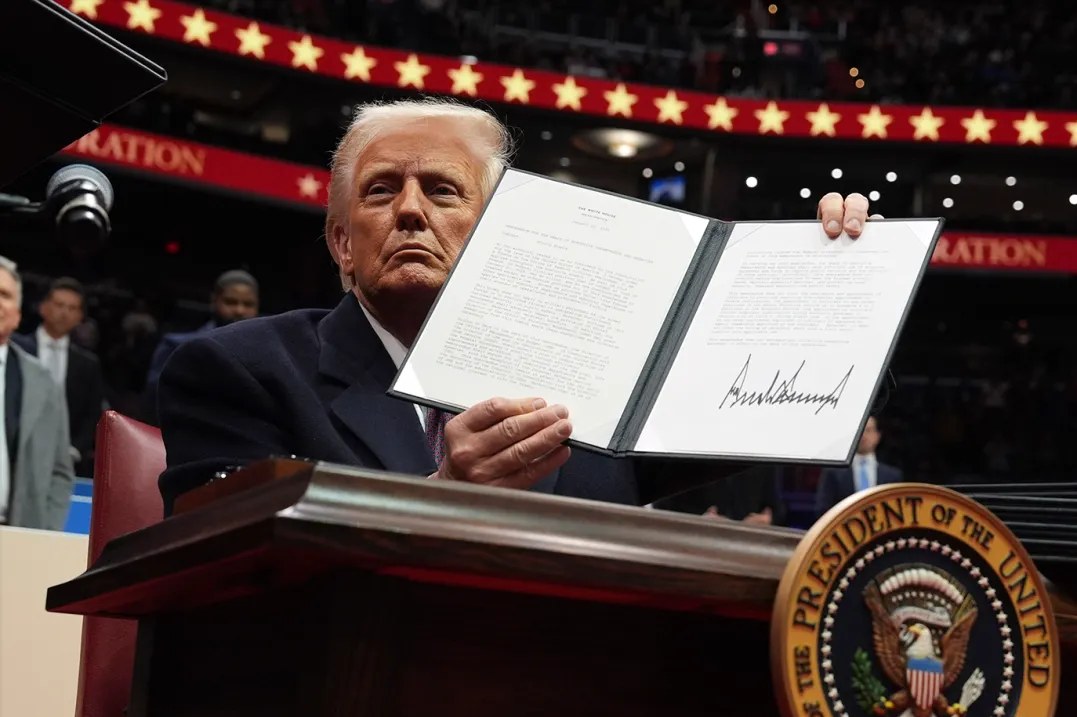President Trump’s second term is coming into much sharper focus in its first 72 hours — delighting his supporters but ringing loud alarm bells for liberal Americans.
Trump has been delivering on the “shock and awe” approach that his allies promised.
The first president since the 19th century to serve nonconsecutive terms, Trump has used his newly regained powers to declare a national emergency at the southern border; designate Mexican drug cartels as terrorist organizations; assail diversity, equity and inclusion programs within the federal government; withdraw from the Paris climate accord and the World Health Organization; and rescind almost 80 policies enacted by his predecessor, former President Biden.
Most controversially of all, Trump pardoned almost all the people convicted of offenses related to the Capitol riot of Jan. 6, 2021, and commuted the sentences of the remainder.
The actions cover several people convicted of seditious conspiracy, a larger number convicted of assaulting or obstructing law enforcement officers and a grand total — including those still facing charges — of more than 1,500 people. About 140 law enforcement officers were injured during the riot, which had been inflamed in large part by Trump’s false claims of election fraud.
Even many Republicans seemed unenthused by Trump’s Jan. 6 pardons, with Speaker Mike Johnson (R-La.) telling reporters at the Capitol on Wednesday he would not “second guess” the commander in chief.
“We’re not looking backwards, we’re looking forwards,” Johnson added.
Beyond the pardons, the new president’s first days back at the White House have offered a bracing reminder of the chaotic showmanship in which he revels.
Trump has danced with a sword to the Village People’s “Y.M.C.A,” given impromptu remarks to reporters about subjects including Russian President Vladimir Putin and verbally attacked the Episcopalian bishop of Washington on social media.
As if that was not enough, Trump ally Elon Musk ignited a firestorm of his own when he twice made a gesture that resembled a fascist salute during a rally at Washington’s Capital One Arena on Monday. Others, including the Anti-Defamation League, have argued Musk’s gesture was awkward but meant to show his heart was with Trump supporters.
In total, Trump’s actions have elicited a mix of shock and familiarity among the president’s fans and foes alike.
Elected Republicans have welcomed his actions.
In two of many examples, Sen. Lindsey Graham (R-S.C.) wrote on social media, “I completely support designating certain Mexican and other foreign drug cartels as foreign terrorist organizations under U.S. law,” and Sen. Ted Cruz (R-Texas) enthused that Trump’s Cabinet picks are “all change agents who are ready to disrupt the deep state.”
On social media, pro-Trump Americans have posted about “promises made, promises kept” — a reminder that Trump’s plans were no secret when the electorate handed the keys to the White House back to him last November.
Conservative commentator Megyn Kelly wrote on social media: “It’s like we went to sleep, woke up and all of our dreams have come true.”
For liberals, however, the dream is a nightmare.
Rep. Alexandria Ocasio-Cortez (D-N.Y.) made reference to the Musk gesture in an Instagram post on Tuesday in which she said, “If you’re cool and want to defend the ‘Sieg Heils’ and the Nazi salutes … whatever you want to do, that’s on you. I’m on the opposite side of that. I’m not with the Nazis.”
Ocasio-Cortez was among a number of Democrats, including Speaker Emerita Nancy Pelosi (D-Calif.), who stayed away from Trump’s inauguration.
The bishop with whom Trump has clashed, Mariann Budde, urged him during her National Prayer Ceremony sermon to have “mercy” on people who are scared by his policies and on gay and trans people who “fear for their lives.”
On ABC’s “The View” on Wednesday, the bishop said she “wanted to emphasize respecting the honor and dignity of every human being.”
For Democrats and liberals, there is much to grapple with in Trump’s return to power.
They once believed he had been vanquished by Biden’s victory in the 2020 election and that his rhetoric leading up to the Capitol riot had put the final nail in his political coffin.
Some also believed that one term of Trump had been more than enough for voters to tire of his taste for controversy and verbal combat.
None of that proved true, as the former president returned to power with a clear win in November.
Now he sits at the apex of his power, with GOP majorities in the House and Senate, the Republican ranks in both chambers filled with loyalists and all but bereft of dissenters. The Supreme Court has a 6-3 conservative majority, buttressed by the three justices nominated by Trump during his first term.
Trump’s powers extend into the cultural realm too. At his inauguration, the prominence accorded to tech titans Mark Zuckerberg and Jeff Bezos, as well as Musk, was evidence of the de facto backing Trump now enjoys from a Silicon Valley elite that once regarded him with skepticism if not outright scorn.
Given the new president’s political dominance, not all Democrats have opted for a stance of outright opposition. Some have chosen to try to trim down their political vulnerabilities on Trump’s strongest issues.
The first major legislation taken up by the new Congress was the Laken Riley Act, which mandates the detention of migrants without legal status charged with burglary, theft and shoplifting.
Twelve Senate Democrats joined their Republican colleagues in voting for the measure on Monday.
But even if some Democrats are trying to minimize their vulnerabilities on immigration, that issue is only one detail in a much bigger picture.
The bottom line is that the opposition party is bracing for four more years like the past three days.
For Democrats, it’s a bleak prospect.
The Memo is a reported column by Niall Stanage.



